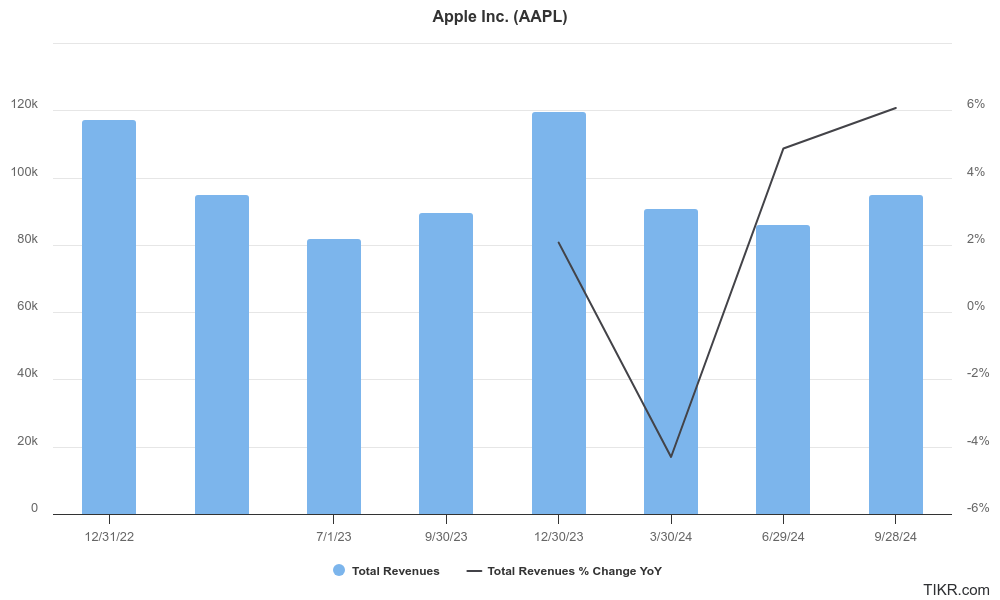Here’s How Analysts Reacted to Apple’s Fiscal Q4 Earnings
Please note that we are not authorised to provide any investment advice. The content on this page is for information purposes only.
Apple (NYSE: AAPL) reported its fiscal Q4 earnings on Thursday after the close of markets. While Apple’s earnings were better-than-expected the stock closed in the red on Friday even as fellow “Magnificent 7” peer Amazon closed sharply higher. Here are the key takeaways from AAPL’s earnings and how analysts reacted to the report.
Key Takeaways from Apple’s Earnings
Apple reported revenues of $94.93 billion which were up 6% YoY and ahead of the $94.58 billion that analysts were expecting. The company’s EPS rose 12% YoY to $1.64 and the metric was ahead of the $1.60 that analysts were expecting.
Looking at the different products, iPhone sales rose 6% to $46.22 billion and came in ahead of the $45.47 billion that analysts were expecting. However, sales of iPad and Mac were a bit shy of estimates. The company’s Services revenues came in at 24.97 billion as compared to $25.28 billion that analysts were modeling.
The company generated operating cash flows of $27 billion in the quarter and returned $29 billion to shareholders in the quarter, predominantly in the form of buybacks.
In his prepared remarks, Apple’s CEO Luca Maestri said, “We are very pleased that our active installed base of devices reached a new all-time high across all products and all geographic segments, thanks to our high levels of customer satisfaction and loyalty.”
Apple’s Fiscal Q1 Guidance
Apple expects its revenues to rise by “low to mid-single digits” in the December quarter. The company expects services revenue to grow double digits in the current fiscal quarter, at a similar pace in the last fiscal year where the segment’s revenues rose 12.9%. It expects its gross margins to be between 46%-47% in the first quarter of its fiscal year 2025.
Apple’s China Sales Fell Slightly
Meanwhile, even as Apple’s overall sales grow at a healthy pace, its revenues in Greater China fell slightly to $15.03 billion in the September quarter. Apple has lost market share to domestic Chinese smartphone makers, especially Huawei.
The fact that Apple Intelligence features are currently not available in China is not helping matters. Meanwhile, Apple’s CEO Tim Cook remains upbeat on these features and said, “We’re getting great feedback from customers and developers already and a really early stat, which is only three days worth of data: Users are adopting iOS 18.1 at twice the rate that they adopted 17.1 in the year-ago quarter.”
How Analysts Reacted to Apple’s Earnings?
Wall Street analysts were generally impressed with Apple’s earnings and Goldman Sachs analyst Michael Ng reiterated his buy rating and $286 target price on the stock. “We believe that the market’s focus on slower product revenue growth masks the strength of the Apple ecosystem and associated revenue durability & visibility,” said Ng in his note.
He added, “Apple’s installed base growth, secular growth in services, and new product innovation should more than offset cyclical headwinds to product revenue, such as a reduced iPhone unit demand due to a lengthening replacement cycle and reduced consumer demand for the PC & tablet category.”
Morgan Stanley analyst Erik Woodring also maintained his overweight rating on Apple and reiterated the stock as a “top pick.” “Apple is on the cusp of its largest device upgrade cycle ever, as the launch – and limited backward compatibility – of Apple Intelligence, improves upgrade cycles/new user acquisition and accelerates replacement cycles, resulting in a record-breaking FY25/FY26 cycle that is underappreciated by the market today,” said Woodring in his note.
Apple Intelligence
While Apple was seen as a laggard in the AI race, the company announced several exciting features at its Worldwide Developer Conference (WWDC) in June. It unveiled what it termed “Apple Intelligence” while also announcing that ChatGPT would be coming to Apple devices. However, the company started releasing these features only a few days back even as the iPhone 16 went on sale in September.
The late rollout of Apple Intelligence features is seen as dampening iPhone sales and some analysts now expect the projected upgrade cycle to be delayed.
In his note, Bank of America analyst Wamsi Mohan wrote, “In our opinion, the staggered launch of Apple Intelligence creates a product refresh cycle different from the past, where new features are incrementally available to the installed base over time.”
He added, “With iPhones likely flat to modestly up into Dec, we expect iPhone growth to improve through F25 and beyond.”
Warren Buffett Continues to Sell AAPL Shares
Meanwhile, Berkshire Hathaway chair Warren Buffett continues to sell Apple shares and during Q3 the company sold a quarter of its stake in the company. At Berkshire Hathaway’s annual meeting in May, Buffett said that he was selling Apple shares over tax considerations. “It doesn’t bother me in the least to write that check and I would really hope with all that America’s done for all of you, it shouldn’t bother you that we do it and if I’m doing it at 21% this year and we’re doing it a little higher percentage later on, I don’t think you’ll actually mind the fact that we sold a little Apple this year,” said Buffett at this year’s shareholder meeting.
Notably, most economists agree that the US fiscal position is unsustainable and the country would need to cut down on the burgeoning debt which surpassed its GDP long back. Also, the annual interest payments on the debt topped $1 trillion last year. Even Fed chair Jerome Powell has called for an “adult discussion” among lawmakers on the soaring fiscal deficit.
That said, not everyone is convinced that Buffett is selling Apple shares merely for tax reasons – especially considering the aggressive pace at which the “Oracle of Omaha” has been offloading shares.






